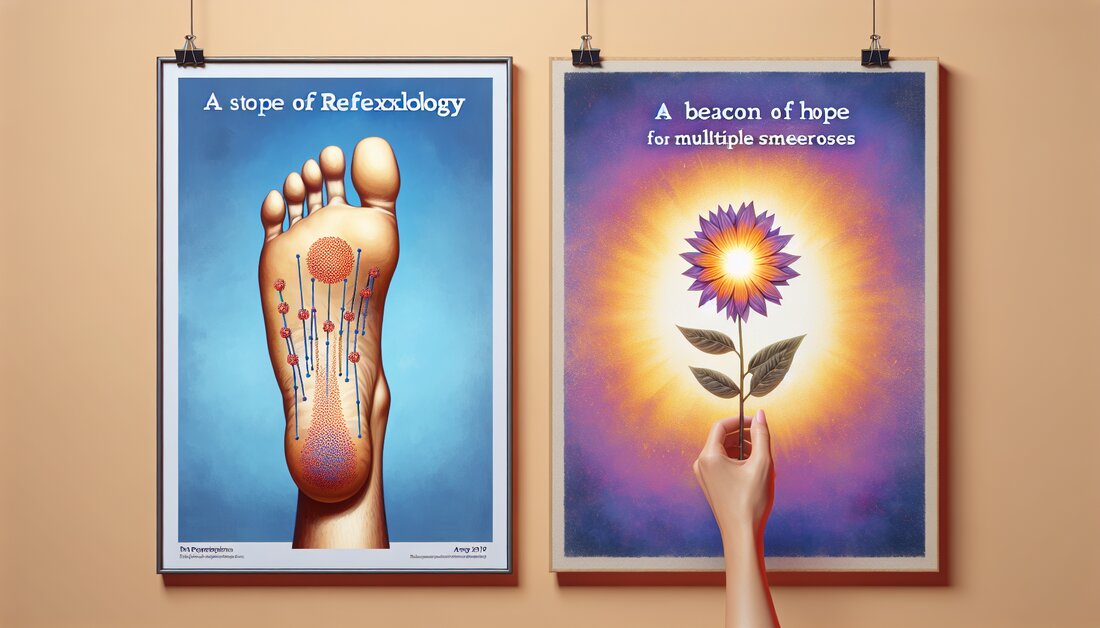Foot reflexology: Glimmer of hope for MS patients
New study shows foot reflexology could relieve MS symptoms and improve quality of life.

Foot reflexology: Glimmer of hope for MS patients
Foot reflexology, a complementary therapy that involves applying pressure to specific points on the feet, is considered helpful for many health conditions. One of the groups that could benefit from this practice is people with multiple sclerosis (MS). MS is a chronic disease of the central nervous system that results in a variety of symptoms, including debilitating fatigue, malaise, sleep problems, anxiety and a generally reduced quality of life. A recent study, published in 2024, aimed to systematically examine the effects of reflexology on patients with MS.
The researchers searched numerous databases for studies published from early 2000 to early 2022, focusing on randomized controlled trials that evaluated the effects of reflexology on MS. Among the 154 studies identified, 9 met the inclusion criteria for the review. These studies included a total of 545 MS patients.
The results of this review suggest that reflexology may lead to a reduction in fatigue, pain, muscle cramps, stiffness and psychological symptoms in MS patients. There were also improvements in bowel and bladder functions as well as general quality of life. Research suggests that reflexology may be a safe and effective method to relieve both physical and psychological symptoms and improve the quality of life of MS patients. However, it is highlighted that well-designed, large-scale clinical trials are needed to confirm the results.
The potential benefits of reflexology could change or complement some of the current practices and treatments for MS. It could be considered as a supportive treatment that relieves symptoms and improves overall quality of life, especially for patients seeking alternative or complementary therapies.
Basic terms and concepts:
- Multiple Sklerose (MS): Eine chronische Erkrankung des Zentralnervensystems, die zu einer Vielzahl von physischen und psychologischen Symptomen führt.
- Fußreflexzonenmassage: Eine Komplementärtherapie, bei der spezifische Punkte an den Füßen massiert werden, die mit verschiedenen Körperteilen und Organen in Verbindung stehen.
- Randomisierte kontrollierte Studie: Eine Studienart, bei der Teilnehmer zufällig einer von zwei oder mehreren Gruppen zugeteilt werden, um verschiedene Behandlungen oder Interventionen zu vergleichen.
- Systematische Überprüfung: Eine Forschungsmethode, bei der systematisch nach Studien zu einem bestimmten Thema gesucht wird, mit dem Ziel, eine umfassende Analyse der vorhandenen wissenschaftlichen Beweise zu diesem Thema zu erstellen.
Effect of foot reflexology on multiple sclerosis
The present systematic review examines the effects of foot reflexology in patients with multiple sclerosis (MS). Multiple sclerosis is a chronic disease of the central nervous system that is often accompanied by symptoms such as fatigue, malaise, sleep problems, anxiety and a reduced quality of life. Previous studies have suggested that reflexology may relieve these accompanying symptoms. The aim of this review was to systematically examine and summarize existing evidence.
methodology
A systematic literature search was conducted in databases such as PubMed, EMBASE and the Cochrane Library. Studies published between January 1, 2000 and January 27, 2022 were considered. Randomized, controlled trials that used foot reflexology as an intervention for MS and reported clinical or psychological symptoms were included. Quality assessment of evidence was performed using the Cochrane bias assessment tool. The literature review and selection of potentially relevant articles was carried out independently by two authors, while a third author reviewed exclusions. Disagreements in the selection process were resolved through discussion among all four reviewing authors.
Results
A total of 154 studies were identified, of which 9 studies with a total of 545 MS patients were included in the review. The most commonly reported outcomes following foot reflexology interventions in MS patients included reductions in fatigue, pain, muscle cramps, stiffness, and psychological symptoms, as well as improvements in bladder and bowel functions and quality of life.
Conclusions
The review conducted suggests that reflexology could be a safe and effective method to reduce physical and psychological symptoms in MS patients and improve quality of life. However, it is emphasized that well-designed, large-scale studies are needed to confirm these results.
You can view further details of the study and its methodological approach at the following link: https://pubmed.ncbi.nlm.nih.gov/38482512.

 Suche
Suche
 Mein Konto
Mein Konto
